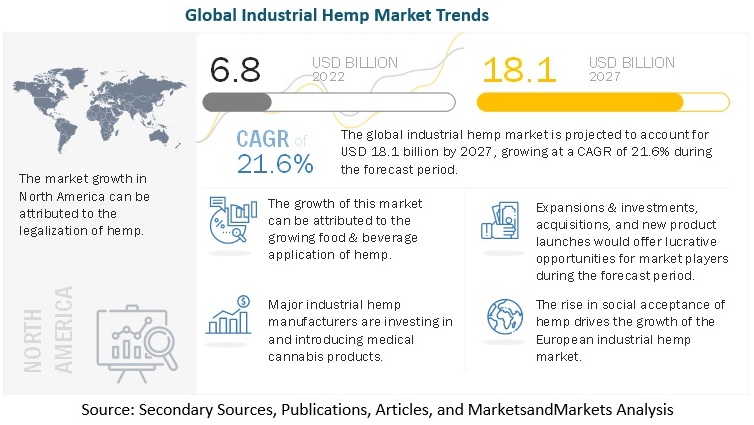
The global industrial hemp market size is estimated to be valued at USD 6.8 billion in 2022 and is projected to reach USD 18.1 billion by 2027, recording a CAGR of 21.6% in terms of value. The increased usage of hemp seeds in a wide range of food and beverage products such as cereals, yogurts, protein powders, and hemp milk is driving the market.
Download PDF brochure: https://www.marketsandmarkets.com/pdfdownloadNew.asp?id=84188417
Key features of the Industrial hemp market
- Increasing legalization and deregulation of hemp cultivation in many countries, leading to more availability of raw materials.
- High demand for hemp-based products such as textiles, paper, and building materials.
- Advancements in cultivation and processing technology, which are driving down costs and improving efficiency.
- Rising interest in hemp as a sustainable alternative to traditional crops, as it requires less water and pesticides to grow.
- Growing use of hemp in the food and beverage industry, particularly for hemp seeds and hemp oil.
Hemp is increasingly being used in food products because it contains essential fatty acids (linoleic and linolenic acid), vitamin E, and minerals such as phosphorus, potassium, sodium, magnesium, calcium, zinc, iron, and protein. Hemp is most consumed as hemp seed, either raw or roasted. Salads, smoothies, yogurt, and cereals all contain it. The increased consumption of plant-based protein due to the global popularity of veganism is expected to drive demand for hemp-based processed food products such as bars, flour, snacks, and cheese.
Hemp grown conventionally is a non-GMO crop grown without the use of pesticides. Conventional hemp does not necessitate the same stringent inspections and guidelines that certified organic hemp does. As a result, they are less expensive than organic Hamp products. Hemp grown conventionally is increasingly being used in the textile and pulp and paper industries. Furthermore, their use in biofuel, construction and material, furniture, and bioplastics has increased their demand. Hemp Factory (Germany) provides a variety of traditional hemp-based products. Unpeeled whole hemp seeds/hemp nuts, peeled hemp seeds/hemp nuts, cold-pressed homo seed oil, refined hemp seed oil, and hemp flour are among the products available.
Request Sample Pages: https://www.marketsandmarkets.com/requestsampleNew.asp?id=84188417
The European market is expected to account for the fastest growth in the industrial hemp market. The growth can be attributed to the increased usage of hemp seed and hemp seed oil in food, beverages, dietary supplements, and personal care products. Furthermore, the use of hemp fiber in a variety of applications, including automotive and construction materials for thermal insulation and soundproofing in automobiles is also driving the growth in Europe. Consumption of hemp seeds in food and other food products such as smoothies, yogurt, cereals, and bars is expected to drive market growth further. In countries such as Germany and the Netherlands, demand for hemp in the form of these products is extremely high, driving the regional market growth.
The Major Players in Industrial Hemp Market are Marijuana Company of America Inc. (US), Cronos Group Inc. (Canada), Ecofibre Limited (Australia), Green Thumb Industries (US), Curaleaf Holdings Inc. (US), GenCanna (US), HempFlax BV (Netherlands), Konoplex Group (Russia), Hemp Oil Canada (Canada), BAFA (Germany), Dun Agro Hemp Group (Netherlands), Colorado Hemp Works (US), Canah International (Romania), South Hemp Tecno (Italy), and MH Medical Hemp GmbH (Germany).
